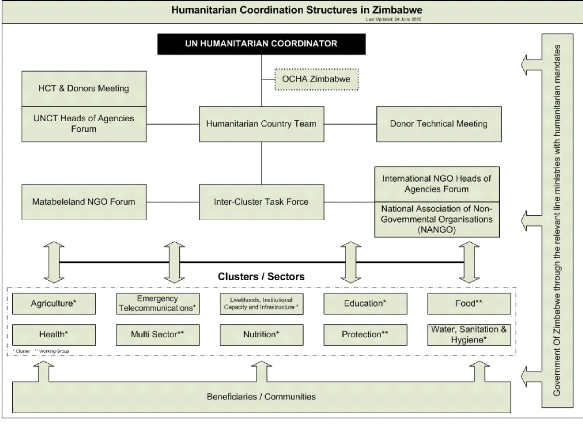1. Specifically, to what extent there may be
opportunities in each sector for existing forums to serve dual functions
2. These are offered only as a basis for conversation
and to illustrate possibilities - the underlying assumptions are based on
superficial understanding.
· Each sector needs to look at the opportunities and
needs for different forums...
1. Through a conversation between humanitarian cluster
coordinators, development leads and partners, to determine ideal
arrangements
2. Where sectors maintain separate development / humanitarian
forums, the need for a lead UN agency to bridge that divide will be
greater...
3. Where sectors use single forums to address the full spectrum
of issues, that need will be less...
The following diagram identifies possible sectors, and
superficial impressions of the way in which membership and issues might overlap
across development and humanitarian contexts18.
18 Office of RC/HC in Zimbabwe, Report of UNCT Retreat
of January 25th 2010

Key Highlights / Current Context
· Education: is currently evolving towards
unified Sector Working Group, co-chaired by Ministry Of Education
· WASH: diffuse line ministry
responsibility means Cluster may continue to play convening role
· Health: increasing participation of GoZ
and is currenty evolving towards unified approach
· Nutrition: cluster providing key
multi-stakeholder forum for addressing nutrition and the GoZ is playing
increasing role
· Food Aid: potential 2010 and 2011
vulnerability suggests continuing/increasing role for Working Group
· Agriculture: cluster is active,
theme group is not; cluster can be more inclusive forum for humanitarian /
early
recovery / development issues
· Economy/Employment/Poverty: linkages
between early recovery cluster actors and ZUNDAF actors
· Infrastructure: early recovery cluster
and specific activities from other clusters
· Governance/Human Rights: good reasons to
keep governance and protection as separate forums; linkages between governance
and early recovery
· Gender: current coordination mechanisms
effective
· HIV/AIDS: current coordination
mechanisms effective
2.10 Current Humanitarian and Early Recovery
co-ordination structure in Zimbabwe
The Organisation's participation in coordination mechanisms in
Zimbabwe are clusters, International and National NGOs,
UN agencies, Donors, Movements of the Red cross and other
international organisation.
Following is the current Humanitarian and Early Recovery
Coordination structure in Zimbabwe as updated by OCHA
in June 201019
19 OCHA Zimbabwe, Humanitarian Coordination Structure,
June, 2010

34
|
Meetings
|
Chair
|
Frequency
|
Membership
|
Main Objective
|
|
Humanitarian Country Team
|
Humanitarian Coordinator
|
Every two months
alternating with
HCT/Donor
|
HCT members (HC; Heads of UN agencies; Heads of 5 elected
NGOs)
|
Discussions and decision-making on humanitarian
strategies and policies
|
|
HCT + Donors
Technical Meeting
|
The Humanitarian Coordinator
|
Every two months
alternating with
HCT/Donor
|
HCT members (HC; Heads of UN agencies; Heads of 5 elected
NGOs) and Donors Technical
|
Discussions and decision-making on humanitarian
strategies and policies
|
|
Donors Technical
Meeting
|
Head of OCHA Office
|
Every two months
|
Donors Technical. Cluster leads can be invited to discuss
specific issues.
|
Consultations with donors at technical level to agree on priority
areas for funding as well as brief donors on the latest developments in
humanitarian response in Zimbabwe, including challenges faced in
implementation, gaps in funding and ERF related issues; Building consensus on
advocacy issues.
|
1. Inter-Cluster Task Force Meeting
|
Head of OCHA Office
|
Bi-weekly (Tuesdays
directly preceding the HCT)
|
Cluster Leads, Co-Leads, Gen CAP advisor
|
Operational discussions and development of inter-cluster
strategies and response activities;
Development of inter-cluster operational guidance materials;
Advise HCT on changes to (inter-cluster) humanitarian strategies; Formulate
strategic and/or policy proposals for HCT decision-making
|
2. Humanitarian Contact Group
|
Head of OCHA Office
|
Monthly (third Monday of each month)
|
Open participation by humanitarian
stakeholders - all at technical level
|
Exchange of technical information on humanitarian action and
challenges in Zimbabwe
|
3. HC/NGO Consultative meeting
|
|
The Humanitarian Coordinator
|
Quarterly (third
Tuesday of first
months of each
|
HC and Heads of NGOs
|
Consultations with NGOs on humanitarian issues, challenges,
bottlenecks and related
developments
|
|
|
|
quarter or when the
need arises)
|
|
|
|
4. Cluster Meetings
|
Cluster Leads
|
Monthly
|
Cluster members
|
Strategize and coordinate humanitarian activities at cluster
level and share information and address challenges and bottlenecks faced by
cluster members; Report the Inter-Cluster Task Force on issues of concern, gaps
and overlaps between clusters
|
| 


